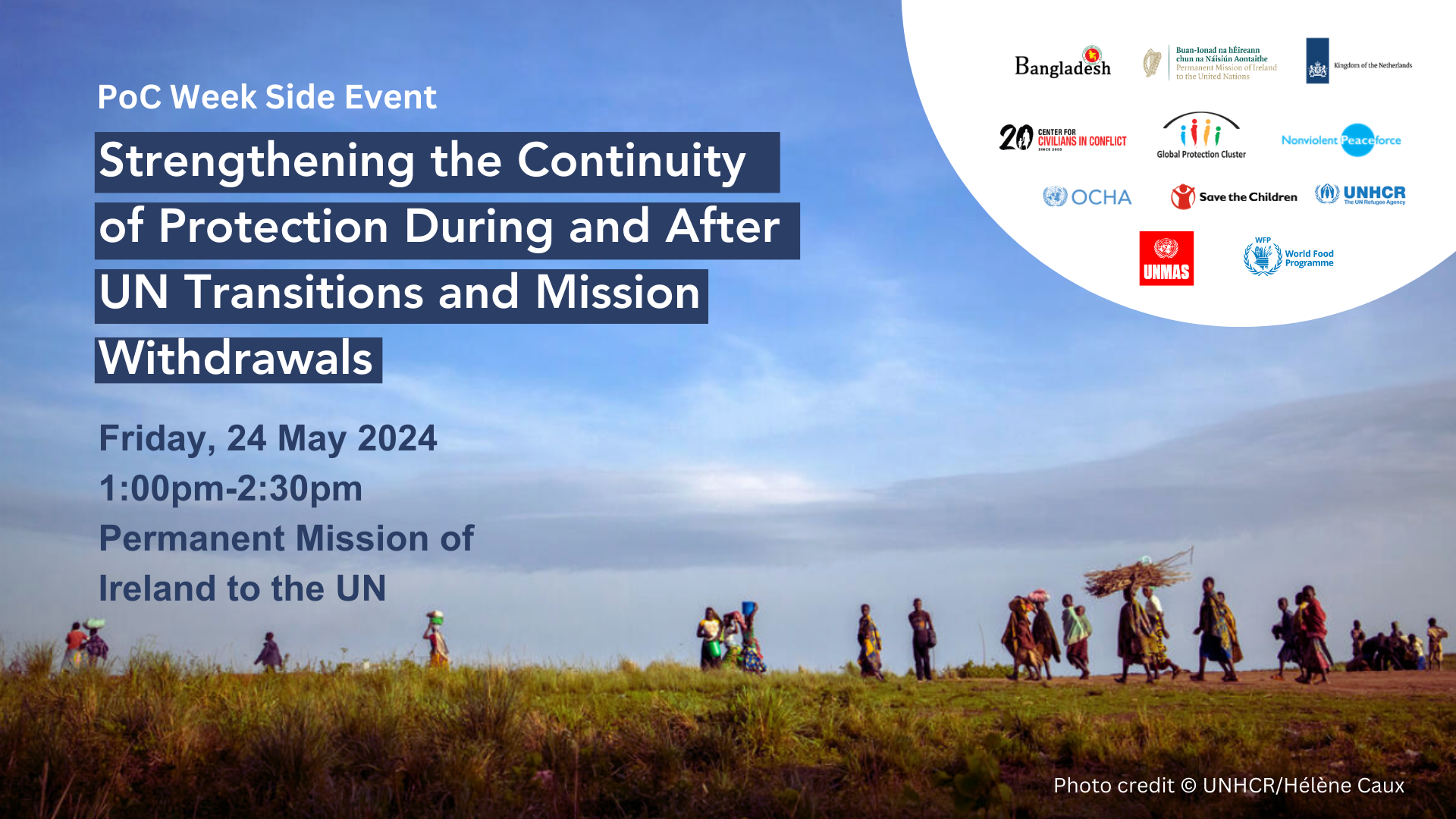The Protection of Civilians in contexts of conflict remains a critical but challenging undertaking in crisis contexts globally. This includes with regards to the Protection of Civilians (PoC) as a central aspect of the mandate for multidimensional peacekeeping operations and a focus for a number of special political missions. While there remains difference in mandates and related efforts of these types of missions, they have often been a key mechanism through which particular protection actions are carried out.
In 2021, UN Security Council Resolution 2594 aimed to address the urgent challenges surrounding peacebuilding and stabilization efforts, emphasizing the need to prevent a deterioration of the Protection of Civilians’ environment during peace operation transitions. The Resolution acknowledged that mission reconfigurations could heighten risks for civilians, especially vulnerable groups such as women, youth, children, and persons with disabilities. Since then, there has been an increasing acknowledgment of the necessity to thoroughly understand the potential implications and tangible effects of UN transitions on the PoC. It is becoming increasingly clear that tackling these issues demands a holistic approach grounded in relevant legal frameworks, including International Humanitarian Law, that incorporates diverse risk mitigation and protection strategies, with an emphasis on bolstering the capacities and strategies of States in protecting civilians, as outlined in the Resolution. Such efforts may be carried out by States in collaboration with local and international protection actors and other allies, all dedicated to mitigating protection risks and strengthening protection outcomes for affected people.
The challenges with such transitions and the continuity of protection have been brought further to the forefront in 2023, with decisions made by the UN Security Council to terminate the mandates of the UN Missions in Mali and Sudan, at the request of host governments. As a result, both protection actors and affected communities have been grappling with a complex landscape in terms of potential increase in protection risks as well as changing supports, capacities and resources for addressing them. This has been compounded by widespread misunderstanding and disinformation about mission mandates and shrinking humanitarian space.
This event will delve into implications for and approaches to supporting the continuity of protection during and after UN transitions and mission withdrawals – a concept highlighted by the Secretary-General in the UN Agenda for Protection, launched in Geneva in February 2024. It will unpack the protection risks faced by communities with such transitions and withdrawals and the critical roles of national duty bearers as well as local and international protection actors and allies in supporting protection throughout these processes.
The event will convene a diverse panel of leading experts to shed light on key considerations in relation to the protection implications of UN transitions and mission withdrawals, sharing perspectives from Member States and diverse national and international protection actors. Panelists will share emergent learnings in terms of approaches to protection risk mitigation and response, grounded in the complex realities across different contexts, and start to examine ways forward in supporting the Protection of Civilians during and after UN transitions. Throughout the event, broader reflections will be shared in relation to implementation of SCR 2594 three years on, advancing the Agenda for Protection and related priorities going forward.
The overarching objectives of this event include:
• To raise awareness about the protection implications of recent UN transitions and mission withdrawals
• To strengthen efforts to ensure the continuity of the protection of civilians during and after these transitions and withdrawals.
This discussion seeks to address this through the following guiding questions:
• How are different protection actors and allies working to support the continuity of the Protection of Civilians in contexts undergoing UN transitions and mission withdrawals, and related changes to protection capacities, resources and mechanisms?
• How can we incorporate emergent lessons with regards to ensuring the continuity of PoC during or after transitions and withdrawals going forward, including in other contexts (mission and nonmission)?
• How can we improve the focus on PoC in transition planning? Additionally, what strategies could enhance integrated analysis and approaches to the Protection of Civilians throughout the duration of a mission?
Logistics: The event will take place on Friday, 24 May 2024 at 1.00 - 2.30 pm
Venue: Permanent Mission of Ireland to the UN. 885 2nd Ave 21st Floor. In-person space is limited and registration is required.
Format: The meeting will be hybrid.
• Please register here.
• For online participation, a linked will be shared at a later date.


